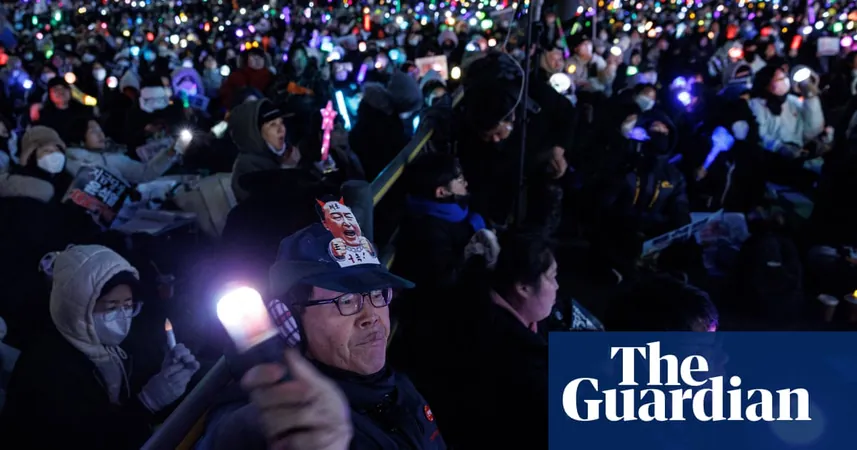
South Korea in Turmoil as Protesters Clash Following Yoon Suk Yeol's Evaded Arrest
2025-01-04
Author: Jia
Overview of the Political Crisis in South Korea
In a dramatic escalation of South Korea's political crisis, thousands of protesters took to the streets in Seoul, demanding either the arrest of suspended President Yoon Suk Yeol or the invalidation of his impeachment. This public demonstration erupted just a day after authorities attempted, but failed, to apprehend Yoon, who has been navigating a precarious legal landscape following his controversial imposition of martial law last month.
Yoon Suk Yeol's Legal Challenges
Yoon, who is reportedly surrounded by loyal security personnel at the presidential residence, is facing grave criminal charges, including insurrection—a charge that does not afford him presidential immunity. If convicted, Yoon could face severe penalties, including imprisonment or, in a worst-case scenario, execution. Such unprecedented circumstances would mark him as the first sitting South Korean president to be taken into custody.
Protests and Public Sentiment
Protests erupted across the capital, with demonstrators divided in their loyalties. Supporters rallied in front of Yoon’s residence, arguing that his removal could jeopardize the country’s security alliances, particularly with the United States and Japan. Kim Chul-hong, a 60-year-old supporter of Yoon, articulated concerns that an arrest might compromise South Korea's defense posture against its northern neighbor, North Korea.
Meanwhile, opposition figures gathered to voice their discontent, with members of the Korean Confederation of Trade Unions attempting to march toward the presidential grounds. Their march was met with a heavy police presence, resulting in clashes that led to injuries and arrests.
Investigations and Political Landscape
The political landscape remains fraught with tension. Investigators are pushing for cooperation from the acting president, Finance Minister Choi Sang-mok, in order to facilitate Yoon's potential arrest. Although two high-ranking officials from the presidential security service denied police requests for questioning, citing their responsibility to safeguard Yoon, the situation remains volatile.
Legal Implications and Future of Yoon's Presidency
Amidst this chaos, the Corruption Investigation Office for High-Ranking Officials (CIO) faces a ticking clock, as the court order for Yoon’s arrest is set to expire soon. Experts believe that investigators may choose to wait for more substantial legal grounds before making another move.
Adding to the complexity, Yoon’s impeachment trial, set to commence on January 14, raises questions about his future political viability. Legal analysts note that without his presence at the trial, a constitutional ruling could strip Yoon of his title, significantly impacting the ongoing crisis.
International Monitoring and Next Steps
With tensions escalating, South Korea's key ally, the United States, is closely monitoring the situation. Outgoing Secretary of State Antony Blinken is scheduled for talks in Seoul, emphasizing the need for political stabilization, especially in light of the looming threat posed by a nuclear-armed North Korea.
Conclusion
As this saga unfolds, the nation stands at a critical juncture, with protests, legal battles, and international diplomacy colliding in a high-stakes political theater that could redefine South Korea’s future.


 Brasil (PT)
Brasil (PT)
 Canada (EN)
Canada (EN)
 Chile (ES)
Chile (ES)
 Česko (CS)
Česko (CS)
 대한민국 (KO)
대한민국 (KO)
 España (ES)
España (ES)
 France (FR)
France (FR)
 Hong Kong (EN)
Hong Kong (EN)
 Italia (IT)
Italia (IT)
 日本 (JA)
日本 (JA)
 Magyarország (HU)
Magyarország (HU)
 Norge (NO)
Norge (NO)
 Polska (PL)
Polska (PL)
 Schweiz (DE)
Schweiz (DE)
 Singapore (EN)
Singapore (EN)
 Sverige (SV)
Sverige (SV)
 Suomi (FI)
Suomi (FI)
 Türkiye (TR)
Türkiye (TR)
 الإمارات العربية المتحدة (AR)
الإمارات العربية المتحدة (AR)